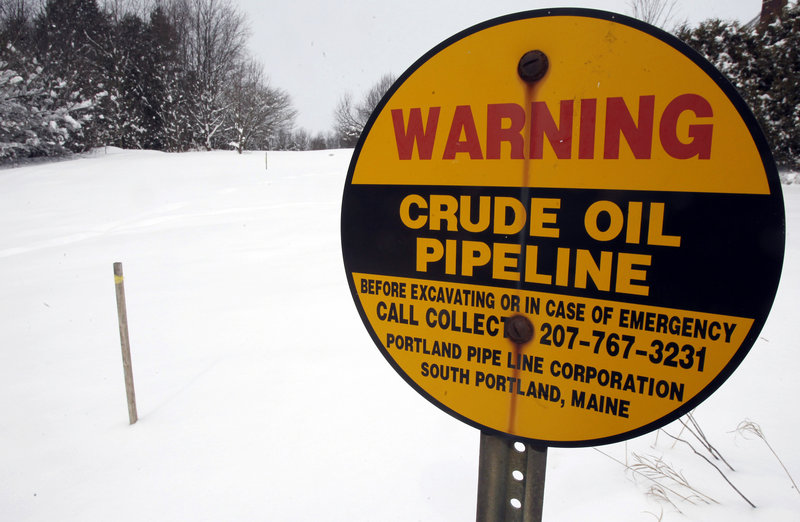SOUTH PORTLAND — The City Council took its first concrete step Monday toward prohibiting Canadian oil sands from being shipped through the city’s port.
By a 6-1 vote, the council approved a moratorium, effective until May 5, that bars the city from approving any project or development that includes loading oil sands onto ships in the city.
The moratorium buys time for city officials to develop a permanent ordinance that would prevent Portland Pipe Line Corp. from reversing the flow in its underground pipe that now pumps crude oil from South Portland to Montreal
“While it is a milestone, this is only a step,” said City Councilor Tom Blake, who has been vocally opposed to oil sands, often referred to by critics as tar sands.
After the vote, in which Councilor Michael Pock was the sole dissenter, cheers and a standing ovation erupted in the City Council chamber. It was a counterpoint to the rejection in November of a citizen-initiated ordinance, known as the Waterfront Protection Ordinance, that had a similar purpose but drew intense opposition from business and petroleum industry groups.
In the coming weeks, the council plans to assemble a committee of three people and hire a facilitator to draft a permanent law – a process to which Portland Pipe Line has already objected.
Chris Gillis, who spoke on the company’s behalf, said Monday that despite a strong and longstanding working relationship with the city, “We have been effectively shut out of the council’s process for the moratorium and told we’re not welcome.”
While the members of the committee have not been named, the council decided last week against forming a larger group that would have included more dissenting voices, in favor of the three-member panel assigned to write a law that would bar the shipment of oil sands through the city.
“As much as I’d like to see total representation, you have to have one focus,” said Mayor Jerry Jalbert. “Hopefully we can meet the deadline.”
In more than two hours of public comment before the vote, several proponents of the moratorium lauded plans to exclude petroleum interests from the ordinance-writing committee, saying that oil companies have an inherent conflict of interest.
The American Petroleum Institute, a powerful lobbying group, has already sent forcefully worded denouncements of the moratorium, arguing that it does not meet Maine’s standards for such emergency measures.
The petroleum institute, which helped fund the opposition to the Waterfront Protection Ordinance, also alleges that the moratorium is unconstitutional and illegal.
In a letter dated Dec. 3, the trade group’s attorney, Harry Ng, all but threatened litigation if the moratorium passes.
“If enacted, the moratorium, like the failed (Waterfront Protection Ordinance), would face strong legal challenges and would be found invalid under state and federal law,” Ng wrote.
Since World War II, Portland Pipe Line Corp. has pumped crude oil from tankers docked in South Portland to refineries in Montreal. Demand for that service has slowed in recent years, and with the rise in the global price of oil, any new source of crude has been viewed as an opportunity.
Canadian oil sands, at 170 billion proven barrels, could potentially meet the world’s continued demand.
But critics say that oil sands, a combination of sticky bitumen, sand and water, is dirtier to refine and is far more dangerous to ship through pipelines, posing serious health, environmental and public safety hazards if spilled.
Oil companies, including Portland Pipe Line, dispute those claims, and say that oil sands are no more risky to pump through a pipeline than traditional crude.
In the spring, South Portland residents collected thousands of signatures to put the Waterfront Protection Ordinance on the ballot in November.
Like the moratorium, the ordinance targeted defining the loading of tankers as an impermissible use, but also included other, more broadly restrictive provisions, which business and petroleum interests feared would shut down all new waterfront development.
Although the ordinance failed by fewer than 200 votes, the extensive campaign made it clear to city councilors that, however flawed the language of the proposed law, residents of South Portland did not want oil sands flowing through their community.
Staff Writer Matt Byrne can be contacted at 791-6303 or at:
mbyrne@pressherald.com
Copy the Story LinkSend questions/comments to the editors.




Success. Please wait for the page to reload. If the page does not reload within 5 seconds, please refresh the page.
Enter your email and password to access comments.
Hi, to comment on stories you must . This profile is in addition to your subscription and website login.
Already have a commenting profile? .
Invalid username/password.
Please check your email to confirm and complete your registration.
Only subscribers are eligible to post comments. Please subscribe or login first for digital access. Here’s why.
Use the form below to reset your password. When you've submitted your account email, we will send an email with a reset code.